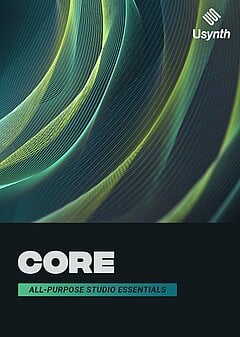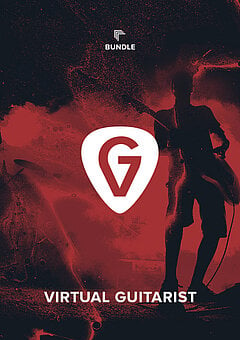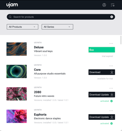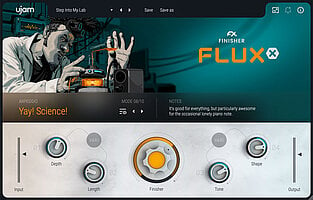Artist Spotlight: Aubrey Whitfield
Releasing with Universal, teaching the next generation and building a thriving career as a music producer and composer
MARCH 12TH, 2023
If you’re an aspiring music producer, you’ll want to pay close attention to Aubrey Whitfield — she’s released music with Universal, BMG, EMI, and has received placements in Love Is Blind, The Great British Bake Off, Coronation Street and many more. We’re diving into her journey as an artist, how she produces her tracks, arranging techniques and more!
Background
Aubrey has been heavily involved in music since she was 11, playing every instrument she could get her hands on under the instruction of her father. She quickly fell in love with all things music-making and songwriting, and for a long time her sole focus was becoming an artist — that is, until she discovered the production side of music. In today’s music industry, you need to be able to do a little of everything, both technical and creative ... and if you love being pulled in tons of different directions, this is a great industry to be in! The more different facets of the craft you learn, the more gigs you’ll be eligible for and the more long-term connections you’ll be able to build.
Plus, if you stick with it for long enough, you'll likely find that your career takes a variety of turns ... and you’ll end up somewhere entirely different from what you imagined when you started out! That's why it's so valuable to build a variety of different skills between writing, production, sound design, and yes, playing an instrument (or even multiple). There are tons of ways to make an income in the music industry, and the more you’re equipped for, the more opportunities that will come your way. You might only be interested in becoming an artist right now, but you can also put those skills to use working with clients and eventually work with some big artists. That’s exactly the path Aubrey took, and in her 6 years of working professionally as a music producer, she's even worked with Little Mix and Kelly Clarkson, among many others.
Having the right tools
There are cons to professional audio work as well, though. Case in point: tight deadlines. The ability to summon inspiration at will and channel it into client deliverables on tight timelines is essential — part of this is the learned skill of identifying the exact point where something's “done enough” that you can move on, but it also requires letting go of judgment, which is no small feat for creatives! The ability to deliver high quality in a short window of time is essential, but it's not all about raw skill; using the right tools is critical, and working professionals have to keep their tech on the cutting edge.
Aubrey frequently needs to create in a number of different styles and genres, producing beats, samples and full tracks with looming deadlines, but very few plugins are equipped with the necessary efficiency. That’s why she relies so heavily on UJAM’s plugins and uses them in nearly every song she creates! She cites the Virtual Guitarists in particular for their versatility and realism, which is especially valuable given her particular take on arranging.
She commonly uses live guitars on her tracks, though even if you do have access to great musicians, it's common for producers to create mockups: sequenced performances of acoustic instruments that get the idea of the track across without ever leaving the DAW. Your guitarists will appreciate knowing exactly what you're looking for, and having a clear vision of the final product makes everyone's life easier. But her desert-island UJAM plugin? Usynth without a doubt, for its versatility and ability to work equally well in virtually any style of music — essential for any working composer!
Building an online presence
On social media, she's known for something a bit different — concise, valuable tutorials on virtually every aspect of the production process: processing techniques, studio setup, how to write for visual media, and tons of other topics that are essential for modern-day producers. This is an excellent way to use your skills to grow a following, especially if you have unique skills or uncommon production techniques you can share. Teaching is an excellent way to make an income online if you have the passion for it, but it’s important to keep in mind that your audience will be other producers and musicians. If you'd rather expand your reach to listeners and fans of course, that requires a very different type of content.
Building a brand is about doing “your thing”, making it accessible to as many people as possible in the subject area you care about. That might involve performing songs you've written, taking your audience behind the scenes and giving them a taste of your process, or anything else that makes sense for your brand. And if your primary goal is to get clients, create content with them in mind — always be sure to keep your primary audience in mind!
Now, you might serve multiple audiences and have widely different streams of income. If that's the case, the most important thing you can do to make your content fun and accessible regardless of which part of your audience it’s meant for. For example, while Audrey focuses her social media on helping the next generation of producers make music they love, she's also been moving her career toward writing music for TV and film; it's possible to “do it all”, as long as you come through in all your content.
Wrapping up
A career in music means constantly adapting to new projects, new technologies, and consistently upgrading your skills in a ton of different areas. The more musical skills you can stack, whether they be production, mixing, writing, mastering, recording, you name it — every ability you add makes it easier to get hired and work on projects you’ve only dreamed of. Aubrey’s continuing story is proof, but hers isn’t the only example ... There's no shortage of opportunities in the music industry if you're willing to invest the time into staying on the cutting edge.
If you want to hear some of Aubrey’s work, you can find her on Instagram here!
Stay up to date
Sign up and we’ll send you an e-mail with product news and helpful stuff every now and then. You may unsubscribe at any time.
Defy Limits
We develop software solutions that enable people to create, consume and interact with music.





